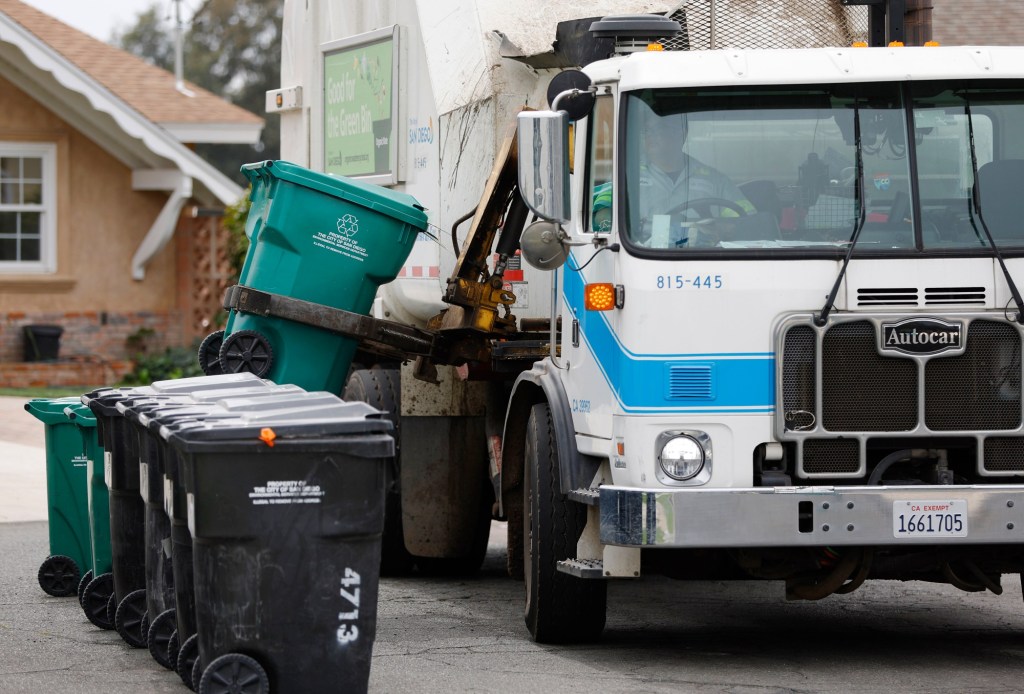Thousands of city of San Diego residents have flooded county offices over concern about increased property taxes but, in some cases, there is a simple explanation: trash.
After decades of offering trash collection for free, San Diego will now charge many residents for trash collection. Residents got their first-ever annual trash charge of $523.20 in property tax bills that went out in early October.
San Diego County Assessor Jordan Marks said his office, and the tax collector’s, have been inundated with in-person visits and phone calls about higher bills. He said there have been more than 2,000 inquiries over the charge, but it was hard to pinpoint an exact number because it’s been a steady stream for weeks. Residents who call the office, at 619-236-3771, get sent to an automated phone tree with the first option to ask about the trash fee.
“The city of San Diego levied and controls this trash fee on your property tax bills,” says a voice recording. “They are the only party that can answer your important questions and address your issues.”
Marks said some confusion comes from city residents choosing a lower trash fee option, but who have been charged the full amount for the most expensive plan at $43.60 per month for a 95-gallon bundle that includes trash, recycling and organics bins. Other options included 65 gallons for $38.94 a month or 35 gallons for $32.82 a month. However, he said almost all San Diegans were charged for the costliest option and will get a discount applied later.
Callers to the Assessor’s Office are transferred to the city’s Environmental Services Department. The city’s rollout of the trash program has been complicated for several reasons: A greater number of people than expected chose the discounted service and more than 5,000 property owners lost city service and need to secure new service from one of the city’s contracted private haulers.
There are other reasons for property tax bills to increase that aren’t related to trash. Numerous school bond measures, approved by voters, are added to property tax bills, like Measure U to pay for improvements to the San Diego Unified School District, or Measure HH to pay for various projects in the San Diego Community College District.
California voters tend to be receptive to school bond measures, with 205 out 267 proposed school bonds passing across the state in November, said EdSource. It was a mixed result in San Diego County in November, with voters largely approving the bonds in wealthier neighborhoods and rejecting them in rural, less affluent communities.
In 1978, voters in California approved Proposition 13, which limits annual property tax increases to 2%. While that is a benefit compared to other states where property taxes can rise much more year-to-year, San Diego County still has some of the most expensive priced housing in the nation, so locals still pay a lot even if it is just a 2% assessed value increase.
The Washington, D.C.-based Tax Foundation’s recent report on property taxes said California was ranked No. 32 for highest property taxes. Illinois had the highest, followed by New Jersey and Connecticut.
The foundation said the median property tax bill for San Diego County in 2023 was $5,542, ranking No. 96 out 3,223 counties, census areas and Puerto Rican municipalities for the highest tax bills. There were 16 counties all tied for first at an estimated $10,001 annual bill, which were mostly in New Jersey and New York.
One reason for the confusion over the trash bill is that many local municipalities, like Chula Vista, have a separate bill for a private hauler not connected to property taxes.
San Diego decided to attach the bills to property taxes because it makes for cheaper administration costs. It cited other cities that also attach trash to property taxes, like Berkeley and San Jose, as examples.
The $523.20 per year charge that many San Diegans received can be paid in two separate payments of $261.60 as part of the twice-yearly property tax bills. It likely appears as a charge on the second page of bills under “SD SOLID WASTE MGMT.”
Trash customers who are on a payment plan with the county for their property taxes — meaning they have missed at least one payment — will automatically receive a 100% trash subsidy. City officials have said they don’t want anyone to lose their home because of a trash bill.
Mark Goldman, a loan officer and real estate analyst with C2 Financial Corp., said the trash charge, likely because it’s not big enough, has not triggered any alerts to people in his industry that they need to change loan estimates for the city of San Diego.
Goldman said the default property tax rate underwriters use for a San Diego County home loan is 1.25% of the purchase price. Yet he said most locals have a tax rate closer to 1.17%, and it’s possible to calculate specific tax rates for cities. So, for home loans, property tax calculations can sometimes be lower than the 1.25%.
Staff Writer David Garrick contributed to this article.
Originally Published: October 22, 2025 at 1:38 PM PDT
